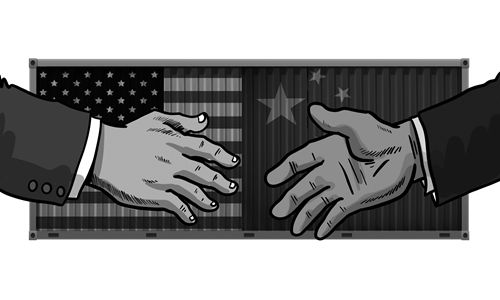HOME >> SOURCE
Trade deal needs follow-up mechanism
By Wei Jianguo Source:Global Times Published: 2020/1/15 18:52:58

Illustration: Luo Xuan/GT
The signature of the phase one trade deal between China and the US is significant for three reasons.First, the global economy is facing great uncertainties. Agencies and organizations such as the International Monetary Fund and the World Bank have forecast a downward trend in the global economy. Now the world's top two economies have called a truce in the trade war, a boon for global economic development and market confidence. A trade deal will trigger bullish stock and real-estate markets and is welcomed by businesses worldwide. Overcoming difficulties and striving for a good start to 2020 are paramount.
Second, China and the US have different social structures, political systems and economic models. Many had anticipated the heated trade war as US President Donald Trump had evidently believed it to be an easy win for the US. However, Chinese people are tenacious and thus united to deal with such hostility, displaying the persistence of the Chinese economy. The two countries were eventually able to bridge the gap and make a deal. That proves there is always a solution, as long as the two countries can work together.
Third, the phase one deal has given off signals that are more significant than the deal itself. These signals show the solid growth of the Chinese economy has been recognized as a hope for the US economy, rather than a threat. The US finally realizes that countries with different economic growth models can co-exist peacefully, and that China is not a rival but a cooperative partner. The deal has shown that the two countries are able to find common ground and solve problems.
The phase one deal has set up a model for and will shed light on several aspects of upcoming negotiations. The purchasing of products and services, intellectual property protection and financial opening-up are issues already on China's agenda. If they are documented in an agreement, there is no reason that China will not enforce them.
China and the US will have a far-reaching influence on global governance and economic development in the future. The signature of the phase one deal has demonstrated that the two countries can use reason to escape the Thucydides Trap. If China and the US can solve disputes in trade and differences in technology, then WTO reform and even geopolitical issues can be resolved as well.
Both sides have realized that the trade war hurt everyone. The US president has come to his senses and seen that Chinese development has benefits for the US in terms of the exports of agricultural products, pork and energy products. Economic development is pursued by the leaders of every country. The US is no exception.
A dispute-resolution mechanism is much needed. A meeting could be held regularly so that the two sides maintain an open channel of communication which can be used whenever a problem emerges. Such a mechanism could find a solution before a problem gets out of hand, and it could benefit both countries.
A phase one deal at the beginning of 2020 is positive news for the world. More people now understand that the Chinese market is open to the US and other countries. Importing agricultural products from the US will not exclude other countries.
The Chinese market is not only a consumer market but also an investment opportunity, and it is likely to become the top-choice investment destination for multinational corporations in 2020.
There will be a follow-up inspection process after the phase one deal, in anticipation of phase two talks. China will honor its word and keep track of the implementation of its opening-up promises. Phase two trade talks will commence after the phase one deal is fully settled. It is impossible to launch phase two negotiations before the results of the phase one deal have been implemented.
The signature of the phase one deal has paved the road for the future meetings of top leaders from China and the US. It is only when the phase one deal bears fruit that there can be broader cooperation in more fields. Certainly, more difficulties and differences are expected as cooperation enters new fields, but it is believed that China and the US can solve these potential problems in the process of phase two negotiations.
The author is a former Chinese vice minister of commerce and executive deputy director of the China Center for International Economic Exchanges. bizopinion@globaltimes.com.cn
Posted in: EXPERT ASSESSMENT